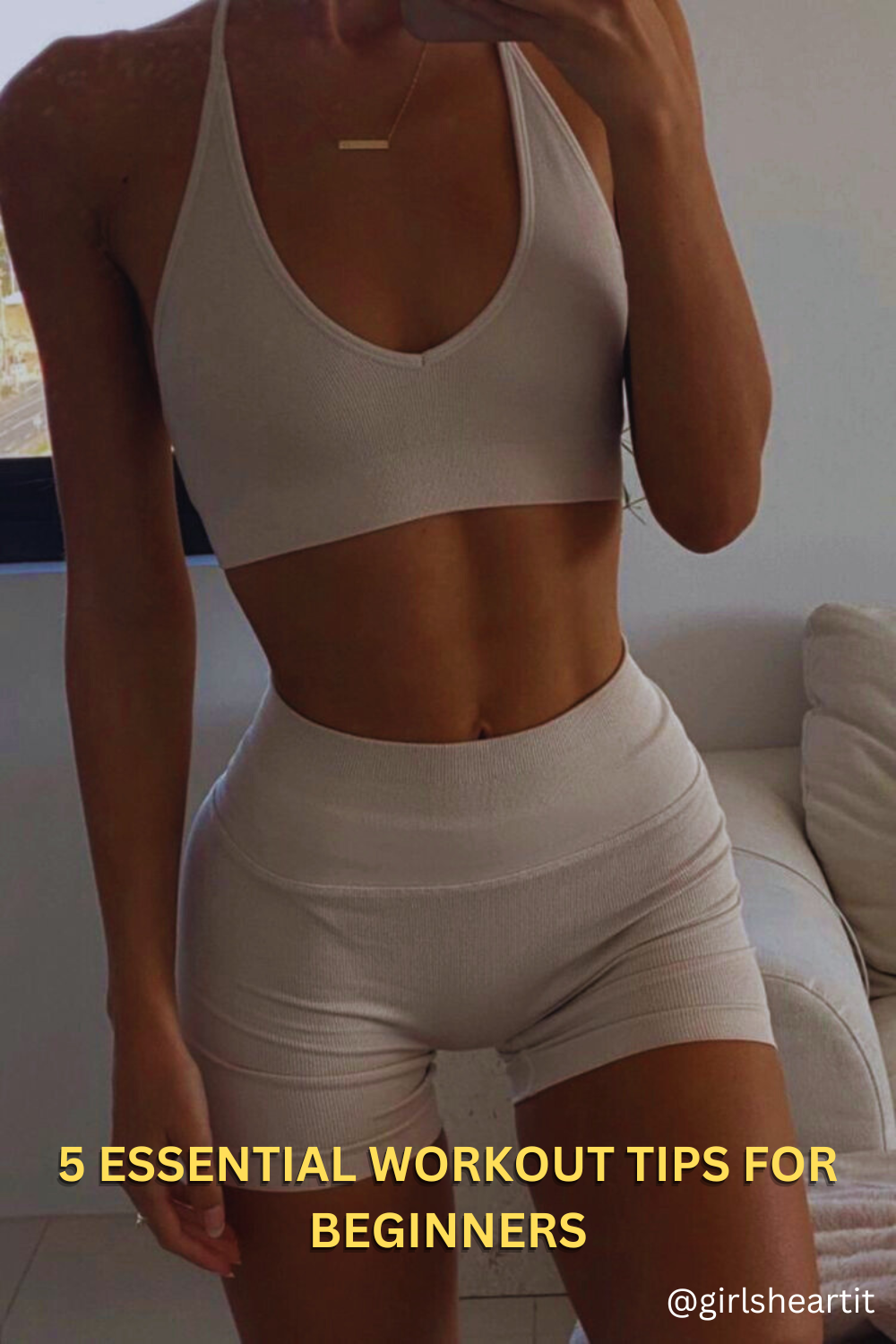Are you just starting your fitness journey? Congratulations! Taking the first step towards a healthier and fitter lifestyle is commendable. As a beginner, laying a strong foundation for your workouts is important to ensure long-term success. That's why I am here to guide you with the 5 essential workout tips for beginners.
Starting off on the right foot is crucial because it sets the tone for your entire fitness journey. By following these tips, you'll be equipped with the knowledge and strategies to make your workouts effective, safe, and enjoyable. Whether you're hitting the gym, exercising at home, or exploring various fitness activities, these tips will help you maximize your efforts and minimize the risk of injuries.
So, let's dive in and discover the tips that will empower you to kickstart your fitness journey confidently. Remember, it's all about taking small steps and making consistent progress. Let's get started on your path to a healthier and fitter you!
This post contains affiliate links from which I may receive a small commission, at no extra cost to you. In no way does this affect my opinion or the information I provide on the product.
5 Essential Workout Tips For Beginners
1. Start Slow and Gradually Increase Intensity.
Introduction
It's important to take things slow and build a strong foundation when you're just starting out on your fitness journey. This is the first essential workout tip for beginners. By gradually increasing the intensity of your workouts, you can prevent injuries and set yourself up for long-term success.
Starting slow means giving your body time to adapt and adjust to the new physical demands you're placing on it. Rushing into intense workouts right away can lead to burnout, muscle soreness, and even injuries. Instead, focus on building a solid base by starting with lighter exercises ad gradually progressing.
Here are a few key steps to keep in mind as you begin:
A) Choose low-impact exercises: Go for activities that are gentle on your joints and muscles. Walking, swimming, or cycling are great options to start with. These activities provide cardiovascular benefits while minimizing the risk of injury.
B) Begin with shorter durations: Initially, aim for shorter workout sessions of around 20-30 minutes. This allows your body to acclimate without overwhelming it. As you become more comfortable, gradually increase the duration of your workouts.
C) Focus on proper technique: Pay attention to your form and technique during exercises. This ensures that you're engaging the correct muscles and reduces the risk of injury. Consider working out with a qualified fitness professional or using instructional videos to learn the proper form of different exercises.
D) Listen to your body: If you feel excessive fatigue, pain, or discomfort during a workout, take it as a sign to slow down or rest. Pushing through discomfort can lead to injuries. It's important to challenge yourself, but not at the expense of your well-being.
Some Product Recommendations
A) Lightweight dumbbells: As you progress and feel ready to incorporate strength training, a set of lightweight dumbbells can be a valuable addition to your workouts. They allow you to gradually increase resistance and build muscle strength.
B) Fitness tracker: Monitoring your progress is essential, and a fitness tracker
can help you keep track of your daily activity, heart rate, and calories
burned. It provides motivation and helps you set achievable goals.
2. Focus on Proper Form and Technique.
When starting your fitness journey, it's crucial to pay
attention to your form and technique during workouts. Proper form not only
helps you get the most out of your exercises but also prevents injuries.
Here are some easy tips to ensure you maintain the correct form:
A) Start with the basics: Begin with exercises that have simple movements and focus on
mastering the correct form before progressing to more advanced exercises. This
will help you build a strong foundation.
B) Engage your core: Activating your core muscles, which include your abs and
lower back, provides stability and protects your spine during exercises. Keep
your core tight and maintain good posture throughout your workouts.
C) Use mirrors or videos: Utilize mirrors in the gym or watch instructional workout
videos to visually guide yourself and compare your form to the correct
technique. This visual feedback can be extremely helpful in making necessary
adjustments.
D) Take it slow: Avoid rushing through exercises. Instead, perform each
movement slowly and with control. This allows you to focus on your form and
prevents relying on momentum to complete the exercise.
Product Recommendation
Resistance Bands
Resistance bands are versatile and affordable workout tools
that can aid beginners in maintaining proper form. They provide assistance and
resistance, helping you perform exercises with the correct technique and
alignment. With various levels of resistance available, they can be easily
tailored to your fitness level. Whether it's using them for squats, shoulder
exercises, or stretching, resistance bands can be a valuable addition to your
fitness routine.
3. Warm-Up and Cool Down
When you're just starting with workouts, it's crucial to pay
attention to your warm-up and cool-down routines. These simple practices can
help prevent injuries, enhance performance, and improve your overall fitness
experience.
Before you jump into your workout, take a few minutes to warm up your muscles and prepare your body for the physical activity ahead.
Here are some easy warm-up exercises you can try:
A) Jumping Jacks: This simple exercise gets your heart rate up and warms up your entire body.
B) Arm Circles: Stand with your feet shoulder-width apart and extend your arms out to the sides. Rotate your arms in small circles, gradually increasing the size of the circles. You can also use some lightweight adjustable dumbbells to perform arm circles for a better result.
C) Leg Swings: Stand next to a wall for support and swing one leg forward and backward, gently stretching your hips. You can use a resistance band to perform leg swings better.
Once you've completed your workout, don't forget to cool
down. Cooling down allows your heart rate and breathing to return to normal
gradually. It also helps prevent dizziness and lightheadedness.
Here's a simple cool-down routine to follow:
A) Walking or light jogging: Slowly decrease your pace and allow your body to transition from high-intensity exercise to a resting state. Use a fitness tracker to track your fitness journey.
B) Stretching: Focus on stretching the muscles you've worked during your workout. Hold each stretch for 15-30 seconds. Use Foam rollers to release tension and improve flexibility.
Remember, warm-ups and cool-downs are essential components
of any workout routine. They prepare your body for exercise and aid in muscle
recovery. By incorporating these practices into your fitness regimen, you'll
set yourself up for success and minimize the risk of injuries.
4. Stay Hydrated.
Staying hydrated is crucial for anyone embarking on a
fitness journey, especially beginners. Proper hydration not only helps to
maximize performance but also supports overall health and well-being.
Why is hydration important during workouts?
During exercise, our bodies lose water through sweat, which
can lead to dehydration if not replenished. Dehydration can negatively impact
physical performance, increase the risk of injury, and even impair cognitive
function. By staying hydrated, beginners can optimize their workout experience
and achieve better results.
Tips for staying hydrated:
A) Drink water before, during, and after workouts: Begin your
workout adequately hydrated by drinking water beforehand. During exercise, aim
to sip water regularly, especially if the intensity is high or if you're
sweating profusely. After the workout, replenish the fluids lost by consuming
water again.
Consider using a reliable and convenient water bottle with a built-in straw or nozzle, such as Flask Sports Water Bottle. It allows for easy access to water during workouts and encourages regular hydration.
B) Monitor urine color: Pay attention to the color of your urine as it can be an
indicator of hydration levels. Ideally, urine should be pale yellow or
straw-colored. Darker urine may indicate dehydration, so drink more water if
you notice this.
C) Include electrolytes: When we sweat, we not only lose water but also essential
electrolytes like sodium, potassium, and magnesium. To replenish these
electrolytes, consider consuming beverages or snacks that contain
electrolyte-rich ingredients. Try Keto Electrolyte Powder Packets, a delicious and easy-to-mix powdered drink that provides a balance of electrolytes to support hydration and optimize performance.
5. Listen to Your Body.
When starting your fitness journey, it's important to listen
to your body and understand its signals. Your body knows best, and by paying
attention to its cues, you can avoid injuries and make progress at a pace that
suits you.
Why is it important to listen to your body?
Listening to your body allows you to avoid pushing yourself
too hard, which can lead to injuries or burnout. It's crucial to strike a
balance between challenging yourself and knowing when to rest. By tuning in to
your body's needs, you can customize your workout routine and make it more
effective.
Tips for listening to your body:
A) Start with a fitness tracker: Consider using a fitness tracker to monitor your heart rate,
sleep patterns, and overall activity levels. This can provide valuable insights
into your body's responses to exercise.
B) Keep a workout journal: Record your workouts, including how you felt during and after each session. This will help you identify patterns and make adjustments as needed.
C) Rest and recovery: Don't be afraid to take rest days or incorporate active recovery activities such as stretching or yoga. Rest is essential for muscle repair and growth.
D) Modify your workouts: If a certain exercise or movement causes pain or discomfort, try modifying it or seeking alternatives that work better for your body.
Conclusion
By following these essential workout tips for beginners, you'll set a strong foundation for your fitness journey. Start slowly, focus on proper form, warm up and cool down, stay hydrated, and listen to your body. These practices will help you avoid injuries, build endurance, and make progress at your own pace.
Remember to celebrate small victories and enjoy the process. Fitness is a personal journey, so customize your needs to suit your needs. Stay motivated, set realistic goals, and embrace the positive changes that regular exercise brings.
Stay tuned for more tips in our upcoming articles. Keep up the great work, and remember that you have the power to transform your body and life through fitness. Get ready to unleash your full potential and discover a healthier, stronger you.


.png)
Share your opinion: